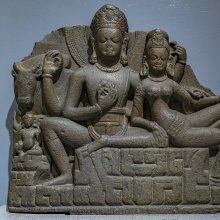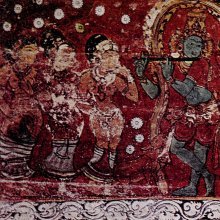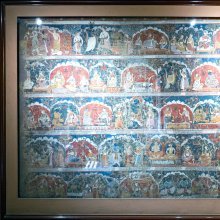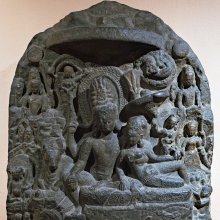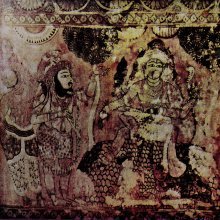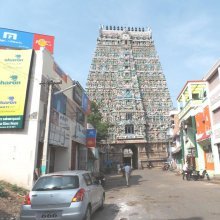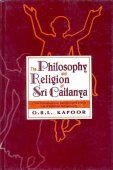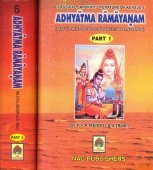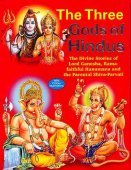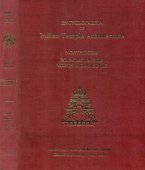Divine: 1 definition
Introduction:
Divine means something in Hinduism, Sanskrit. If you want to know the exact meaning, history, etymology or English translation of this term then check out the descriptions on this page. Add your comment or reference to a book if you want to contribute to this summary article.
Images (photo gallery)
(+35 more images available)
In Hinduism
Yoga (school of philosophy)
Source: ORA: Amanaska (king of all yogas): A Critical Edition and Annotated Translation by Jason Birch(That which is) Divine is denoted by the Sanskrit term Divya, according to the Muṇḍakopaniṣad 2.1.2-3:.—Accordingly, while describing Brahma and the mind: “For, the [cosmic] man is divine (divya), formless, outside and inside [of everything], unborn, breathless, mindless, radiant and higher than the highest imperishable one”.

Yoga is originally considered a branch of Hindu philosophy (astika), but both ancient and modern Yoga combine the physical, mental and spiritual. Yoga teaches various physical techniques also known as āsanas (postures), used for various purposes (eg., meditation, contemplation, relaxation).
See also (Relevant definitions)
Starts with: Divine Abode, Divine chariot, Divine Ear And Eye, Divine flower, Divine plant, Divine power, Divine sight, Divine speech, Three Divine Messengers.
Query error!
Full-text (+5321): Divya, Divyacakshus, Daivika, Daiva, Adhidaiva, Matrigana, Kaivalya, Lila, Matri, Devatman, Vedanindaka, Daivata, Bhagavat, Nandi, Aishvarya, Brahma, Divyajnana, Apaurusheya, Mantra, Advaita.
Relevant text
Search found 513 books and stories containing Divine, The divine; (plurals include: Divines, The divines). You can also click to the full overview containing English textual excerpts. Below are direct links for the most relevant articles:
Archives of Social Sciences of Religions
Divine Wealth: Religion and Economy in India's Merchant World < [Volume 152 (2010)]
Superstition and Ideology in Iranian Politics: From Majlesi to Ahmadinejad < [Volume 164 (2013)]
The Kula Ritual in Abhinavagupta's Tantrāloka: Insights from Chapter 29 < [Volume 131-132 (2005)]
Studies in Indian Literary History (by P. K. God)
50. The Samudra-Sangama by Dara Shukoh < [Volume 2 (1954)]
Postscript by the general editor (Volume 2) < [Volume 2 (1954)]
27. Vagbhata, the author of the Astanga-hrdaya and his Commentators < [Volume 1 (1945)]
Yoga Vasistha [English], Volume 1-4 (by Vihari-Lala Mitra)
Chapter XXXIX - Vasishtha's gita or sermon on the sweet peace of mind < [Book VII - Nirvana prakarana part 2 (nirvana prakarana)]
Chapter CCVIII - Solution of the great question < [Book VII - Nirvana prakarana part 2 (nirvana prakarana)]
Chapter CLXXXVI - Demonstration of all nature (and thing) as brahma himself < [Book VII - Nirvana prakarana part 2 (nirvana prakarana)]
Jnaneshwari (Bhavartha Dipika) (by Ramchandra Keshav Bhagwat)
Verse 9.32 < [Chapter 9 - Raja-vidya and Raja-guhya Yoga]
Verse 16.5 < [Chapter 16 - Daivasura-sampad-vibhaga-yoga]
Verse 16.6 < [Chapter 16 - Daivasura-sampad-vibhaga-yoga]
Notices of Sanskrit Manuscripts (by Rajendralala Mitra)
Related products
(+17 more products available)
